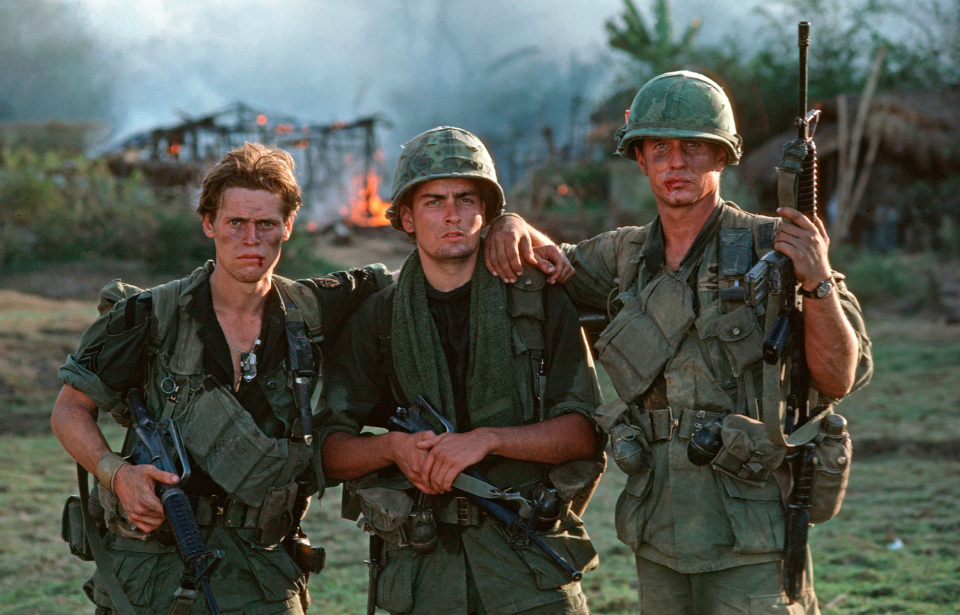Platoon (1986) is a highly praised movie set in the Vietnam War. Featuring standout performances by Charlie Sheen, Tom Berenger, and Willem Dafoe, it was directed by Oliver Stone, who injected the film with his personal experiences as a soldier in the war.
Here are six other films set in the Vietnam era that you might enjoy if you liked Platoon.
The Deer Hunter (1978)
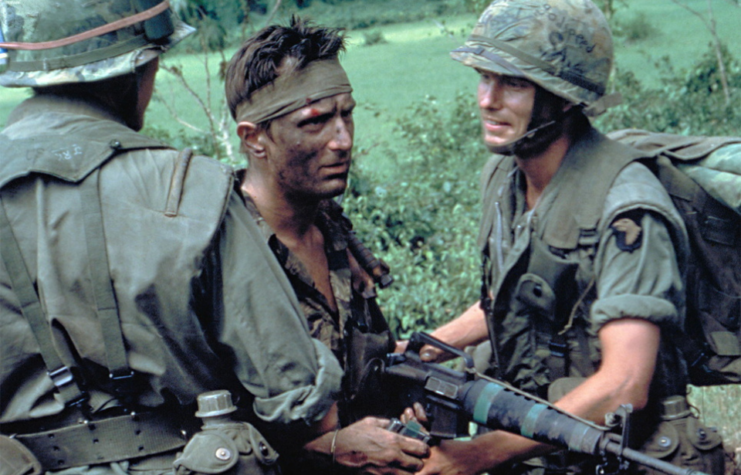
The Deer Hunter (1978) chronicles the lives of three working-class friends – Michael “Mike” Vronsky (Robert De Niro), Steven Pushkov (John Savage), and Nickanor Chevotarevich (Christopher Walken) – in a small Pennsylvania steel town before, during and after their traumatic experiences in the Vietnam War.
Split into three distinct acts, the film first delves into the characters’ daily lives and relationships at home. It then portrays their time as prisoners of war (POWs) in Vietnam, before transitioning to their struggles to cope with the physical and psychological aftermath of the conflict.
Exploring themes of friendship, the toll of war, combat trauma and the challenges of reintegrating into civilian life, The Deer Hunter vividly captures the psychological horrors of war, epitomized by its iconic Russian roulette scenes in the Vietnamese prison camp.
Moreover, the film delves into how war molds individuals and shapes their outlooks. De Niro’s character undergoes a profound evolution, grappling with survivor’s guilt and striving to support his friends as they continue to wrestle with the enduring effects of their shared trauma.
Apocalypse Now (1979)
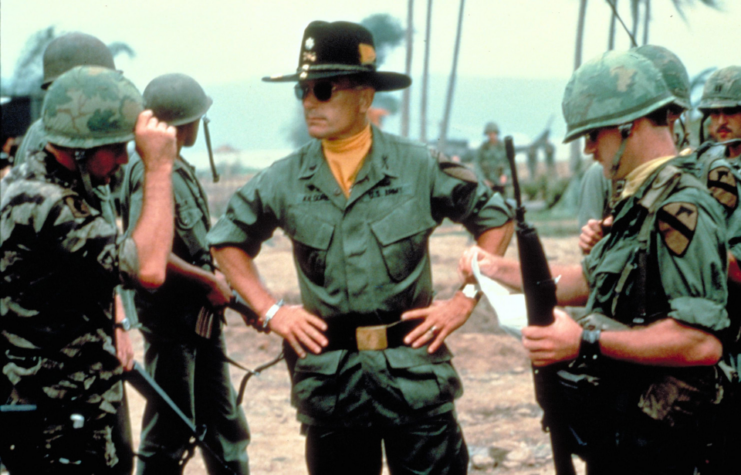
Apocalypse Now (1979) is an epic war film directed by Francis Ford Coppola and based on Joseph Conrad’s novella, Heart of Darkness. It chronicles the intense journey of Capt. Benjamin Willard (Martin Sheen), a US Army officer sent on a mission to locate and “terminate with extreme prejudice” Col. Walter E. Kurtz (Marlon Brando), a renegade Special Forces officer who has gone rogue in the Cambodian jungle.
The film stands out for its dark and surreal portrayal of the psychological impact of war. As Willard navigates upriver on a US Navy patrol boat, he encounters a series of increasingly unsettling and bizarre situations, revealing the chaos, brutality, and moral uncertainty of war, as well as the mental collapse of soldiers affected by the conflict.
Willard’s journey to Kurtz’s secluded compound devolves into a plunge into insanity, where he grapples with his own inner struggles and questions authority, power, and the pointlessness of war. Apocalypse Now delves into themes of inherent human darkness, the blurred boundaries between civilization and savagery, and the moral dilemmas of conflict.
Full Metal Jacket (1987)
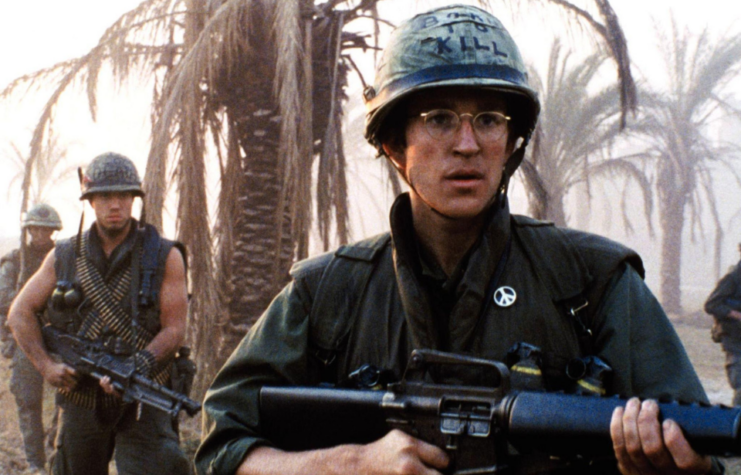
Full Metal Jacket (1987), directed by Stanley Kubrick, is a movie that’s divided into two distinct parts, each offering a unique perspective on the experiences of US Marines during the Vietnam War.
The first half follows a group of young recruits through their grueling training at the Marine Corps Recruit Depot, Parris Island, where they’re subjected to intense physical and psychological challenges under the harsh guidance of the tough-talking Gunnery Sgt. Hartman (R. Lee Ermey). This part explores the dehumanizing process of turning civilians into disciplined soldiers and delves into the psychological toll that such training takes on the recruits.
The second half shifts to the Vietnam War itself and follows Pvt. J.T. “Joker” Davis (Matthew Modine) as he becomes a combat correspondent for Stars and Stripes. The movie takes audiences into the chaotic and brutal realities of the conflict, highlighting the harsh environment, the camaraderie among soldiers and the moral dilemmas they face in the midst of violence.
Full Metal Jacket delves into themes of dehumanization, the impact of war, the duality of human nature and the psychological effects of military training. Kubrick’s distinctive directing style, attention to detail and stark visual presentation contribute to the movie’s impactful portrayal of the Vietnam War, and the film’s structure allows it to explore both the training process that molds soldiers and the consequences of said training in the context of actual combat.
Hamburger Hill (1987)
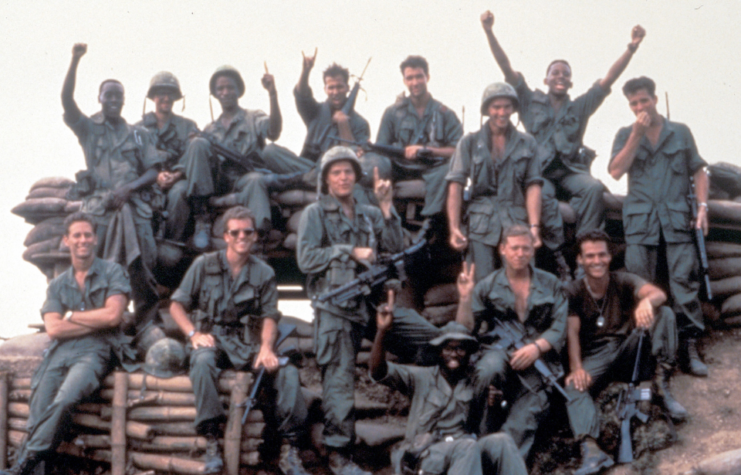
Hamburger Hill (1987) is inspired by the actual Battle of Hamburger Hill during the Vietnam War. The movie offers a gritty and authentic depiction of the intense and brutal combat during the 10-day effort to seize Hill 937—dubbed “Hamburger Hill”—in mid-May 1969.
The film follows a platoon of young, diverse soldiers as they strive to advance against a well-defended enemy position. The battle is shown in visceral detail, highlighting the challenges, sacrifices, and horrors the soldiers encounter while navigating the treacherous terrain and engaging in relentless combat.
Hamburger Hill examines the futility of certain military operations during the Vietnam War, as the soldiers question the purpose and strategic value of the hill they are fighting to capture. The movie also addresses the controversies and debates surrounding the war effort back home and the disconnect between the soldiers on the ground and the decisions made by high-ranking officers.
Through its realistic depiction of warfare, Hamburger Hill conveys the physical and emotional toll combat inflicts on soldiers, emphasizing the complexities and moral dilemmas inherent in war. The film honors those who fought in the battle and provides a sobering reflection on the human cost of armed conflict
Casualties of War (1987)
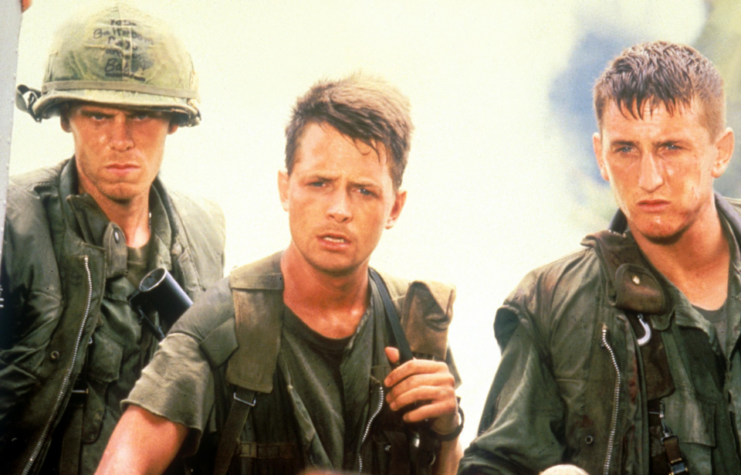
Casualties of War (1987) is based on the true story of a group of American soldiers during the Vietnam War who commit a horrific crime against a young Vietnamese woman.
The movie follows Pvt. Max Eriksson (Michael J. Fox), a morally conscious soldier who becomes a witness and an unwilling participant in the abduction, assault and murder of a Vietnamese girl by his comrades. As events progress, Eriksson struggles with his sense of duty, morality and loyalty as he tries to prevent and, then, expose the crime.
The movie offers a sobering and disturbing look at the brutal realities of war and the potential for cruelty that can emerge in the midst of conflict. Its portrayal of the internal conflict faced by Eriksson and the ethical dilemmas he confronts add depth to the narrative and highlight the complexities of human behavior in extreme circumstances. The film serves as a powerful exploration of the dark side of war and the capacity for cruelty and compassion that can coexist within individuals.
Born on the Fourth of July (1989)
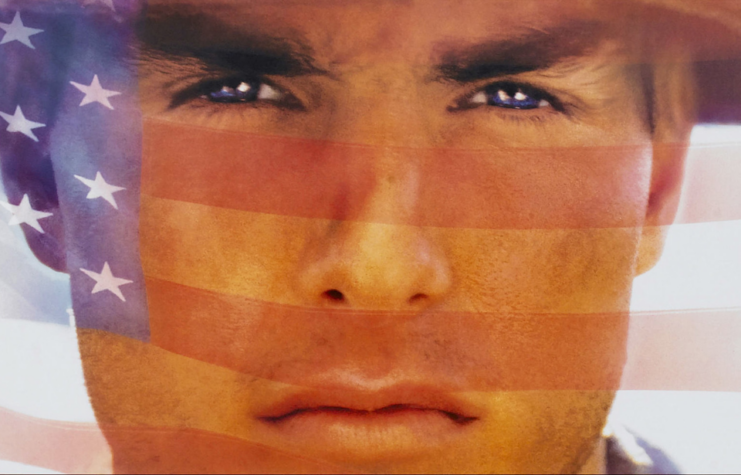
Born on the Fourth of July (1989) is a biographical war drama directed by Oliver Stone. Based on the real-life experiences of Ron Kovic, it follows the Vietnam War veteran’s journey from an eager and patriotic young man to a disillusioned and outspoken anti-war activist in the aftermath of the conflict.
The movie stars Tom Cruise as Kovic and portrays his transformation from a starry-eyed teenager who enlists in the US Marine Corps with patriotic fervor to a paralyzed veteran who becomes a vocal critic of the Vietnam War and a passionate advocate for veterans’ rights.
More from us: Dale Dye Ensured These Military Movies Were As Authentic As Possible
Born on the Fourth of July examines themes of patriotism, disillusionment, the impact of war on individuals and society, and the challenges faced by veterans as they return home. It portrays Kovic’s physical and emotional struggles following his paralysis in combat, including the difficulties he encounters while adjusting to his new reality.
